全新版大学英语快速阅读第二册课文
Cheetahsinfocus全新版大学英语试听阅读2中英双语概括
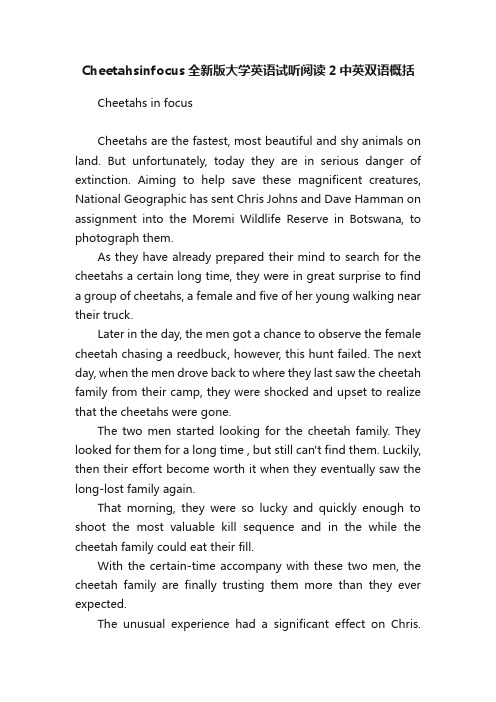
Cheetahsinfocus全新版大学英语试听阅读2中英双语概括Cheetahs in focusCheetahs are the fastest, most beautiful and shy animals on land. But unfortunately, today they are in serious danger of extinction. Aiming to help save these magnificent creatures, National Geographic has sent Chris Johns and Dave Hamman on assignment into the Moremi Wildlife Reserve in Botswana, to photograph them.As they have already prepared their mind to search for the cheetahs a certain long time, they were in great surprise to find a group of cheetahs, a female and five of her young walking near their truck.Later in the day, the men got a chance to observe the female cheetah chasing a reedbuck, however, this hunt failed. The next day, when the men drove back to where they last saw the cheetah family from their camp, they were shocked and upset to realize that the cheetahs were gone.The two men started looking for the cheetah family. They looked for them for a long time , but still can't find them. Luckily, then their effort become worth it when they eventually saw the long-lost family again.That morning, they were so lucky and quickly enough to shoot the most valuable kill sequence and in the while the cheetah family could eat their fill.With the certain-time accompany with these two men, the cheetah family are finally trusting them more than they ever expected.The unusual experience had a significant effect on Chris.Hopefully, he can fulfill his responsibility of bringing the endanger animals into world focus and maybe his action will work.猎豹焦点猎豹是陆地上最快,最美丽,最害羞的动物。
全新版大学英语第二版第二册Unit2课文译文及参考答案
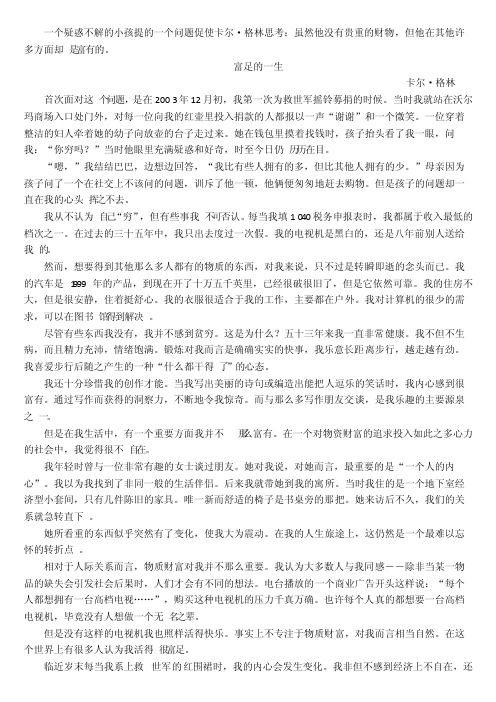
一个疑惑不解的小孩提的一个问题促使卡尔·格林思考:虽然他没有贵重的财物,但他在其他许多方面却是富有的。
富足的一生卡尔·格林首次面对这个问题,是在2003年12月初,我第一次为救世军摇铃募捐的时候。
当时我就站在沃尔玛商场入口处门外,对每一位向我的红壶里投入捐款的人都报以一声“谢谢”和一个微笑。
一位穿着整洁的妇人牵着她的幼子向放壶的台子走过来。
她在钱包里摸着找钱时,孩子抬头看了我一眼,问我:“你穷吗?”当时他眼里充满疑惑和好奇,时至今日仍历历在目。
“嗯,”我结结巴巴,边想边回答,“我比有些人拥有的多,但比其他人拥有的少。
”母亲因为孩子问了一个在社交上不该问的问题,训斥了他一顿,他俩便匆匆地赶去购物。
但是孩子的问题却一直在我的心头挥之不去。
我从不认为自己“穷”,但有些事我不可否认。
每当我填1040税务申报表时,我都属于收入最低的档次之一。
在过去的三十五年中,我只出去度过一次假。
我的电视机是黑白的,还是八年前别人送给我的。
然而,想要得到其他那么多人都有的物质的东西,对我来说,只不过是转瞬即逝的念头而已。
我的汽车是1999年的产品,到现在开了十万五千英里,已经很破很旧了,但是它依然可靠。
我的住房不大,但是很安静,住着挺舒心。
我的衣服很适合于我的工作,主要都在户外。
我对计算机的很少的需求,可以在图书馆得到解决。
尽管有些东西我没有,我并不感到贫穷。
这是为什么?五十三年来我一直非常健康。
我不但不生病,而且精力充沛,情绪饱满。
锻炼对我而言是确确实实的快事,我乐意长距离步行,越走越有劲。
我喜爱步行后随之产生的一种“什么都干得了”的心态。
我还十分珍惜我的创作才能。
当我写出美丽的诗句或编造出能把人逗乐的笑话时,我内心感到很富有。
全新版大学英语(第二版)快速阅读3翻译

一Alone in the Arctic Cold 一个人在北极严寒一天打碎了非常寒冷和灰色,当那个人偏离主要育空试验和爬上斜坡,在那里的是一个朦胧而过去向东穿过了踪迹松林之间。
坡率陡峭,而且他停顿了一下喘不过气来保持最佳的状态。
没有太阳和缕阳光,尽管他天空无云。
这是一个晴朗的日子,但在那里似乎是一个蒙上了一层水汽表面看来,把这天黑暗。
这个事实不担心那个人。
他被用来缺乏阳光。
那人回头而且他已经来了。
育空河打下英里宽藏起来了以下3英尺的冰。
这个世界上的冰一样多英尺的积雪。
这是连续的白色的,除了一个黑暗的发际线了痕迹,向南延伸达500英里去的库特关口。
但是,整个神秘,深远的发际线跟踪,没有太阳从天空,巨大的冷的,陌生和怪异的没有什么印象all-made上了的人。
他是新来的人在这地,这是他的第一个冬天。
他的问题他是缺乏想象力。
他很快和警惕在生活的一切,但只有在去吧,而不是在意义。
意思eighty-odd零下五十度学位霜。
这样的事实了冷漠,而且不舒服,就这些。
它并不带他去思考男人的一般是脆弱,能够只活在确定的限度窄的热量和冷。
零下五度代表点冰霜伤害必须提防,利用厚,暖和的衣服。
50度以下零是他就精确50度零度以下。
应该有其他东西了可那是一个思想,从来没有进过他的头上。
当他转身要走,他吐不确定。
就有一个陡坡、易爆裂纹他的震惊。
他吐了。
又一次,空气里之前,这可能下降至雪吐口唾沫裂了。
他知道五十岁的唾沫在雪地上闪现下面,但这吐口唾沫空气中闪现了。
毫无疑问这个五十个更加寒冷below-how要冷得多了不知道。
但是温度还显得无关紧要。
他注定的老我的左边叉子汉德森的孩子们在小溪了。
他们来了在山上从印度人小河的国家,虽然他来拐弯抹角看一看的可能性走出木材来源于群岛的育空。
他要在六营地点,有点天黑之后,这是真的,但男孩们会去,火灾的去,和热晚饭将为此做好准备。
他陷入水中在大松树。
踪迹减弱了。
他很高兴他没有雪橇、旅游的光。
(完整版)全新版大学英语2第二单元ALifeFullofRiches

A Life Full of Riches富足的一生It was early December 2003, my first season as a Salvation Army bell ringer, when I was confronted with the question. I was standing just outside the doorway of a Wal-Mart, offering a "thank you" and a smile to each person who dropped a donation into my red kettle. A neatly dressed woman and her young son walked up to the kettle stand. While she searched her purse for some cash, the boy looked up at me. I can still see the confusion and curiosity in his eyes as he asked, "Are you poor?"首次面对这个问题,是在2003年12月初,我第一次为救世军摇铃募捐的时候。
当时我就站在沃尔玛商场入口处门外,对每一位向我的红壶里投入捐款的人都报以一声“谢谢”和一个微笑。
一位穿着整洁的妇人牵着她的幼子向放壶的台子走过来。
她在钱包里摸着找钱时,孩子抬头看了我一眼,问我:“你穷吗?”当时他眼里充满疑惑和好奇,时至今日仍历历在目。
"Well," I stammered, trying to think, "I have more than some people, but not as much as others." His mother scolded him for the social no-no, and they hurried off to do their shopping. His question, however, did not leave me.“嗯,”我结结巴巴,边想边回答,“我比有些人拥有的多,但比其他人拥有的少。
全新版大学英语 第二版 阅读教程
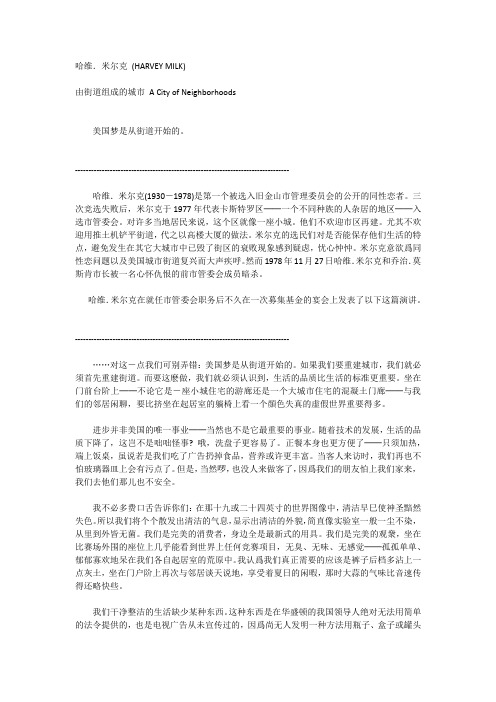
哈维.米尔克(HARVEY MILK)由街道组成的城市A City of Neighborhoods美国梦是从街道开始的。
--------------------------------------------------------------------------------哈维.米尔克(1930-1978)是第一个被选入旧金山市管理委员会的公开的同性恋者。
三次竞选失败后,米尔克于1977年代表卡斯特罗区──一个不同种族的人杂居的地区──入选市管委会。
对许多当地居民来说,这个区就像一座小城。
他们不欢迎市区再建。
尤其不欢迎用推土机铲平街道,代之以高楼大厦的做法。
米尔克的选民们对是否能保存他们生活的特点,避免发生在其它大城市中已毁了街区的衰败现象感到疑虑,忧心忡忡。
米尔克意欲爲同性恋问题以及美国城市街道复兴而大声疾呼。
然而1978年11月27日哈维.米尔克和乔治.莫斯肯市长被一名心怀仇恨的前市管委会成员暗杀。
哈维.米尔克在就任市管委会职务后不久在一次募集基金的宴会上发表了以下这篇演讲。
--------------------------------------------------------------------------------……对这-点我们可别弄错:美国梦是从街道开始的。
如果我们要重建城市,我们就必须首先重建街道。
而要这麽做,我们就必须认识到,生活的品质比生活的标准更重要。
坐在门前台阶上──不论它是-座小城住宅的游廊还是一个大城市住宅的混凝土门廊──与我们的邻居闲聊,要比挤坐在起居室的躺椅上看一个顔色失真的虚假世界重要得多。
进步并非美国的唯一事业──当然也不是它最重要的事业。
随着技术的发展,生活的品质下降了,这岂不是咄咄怪事? 哦,洗盘子更容易了。
正餐本身也更方便了──只须加热,端上饭桌,虽说若是我们吃了广告扔掉食品,营养或许更丰富。
当客人来访时,我们再也不怕玻璃器皿上会有污点了。
全新版大学英语第二册1~4单元课文背诵及翻译

全新版大学英语第二册1~4单元课文背诵及翻译12 One way of summarizing the American position is to state that we value originality and independence more than the Chinese do. The contrast between our two cultures can also be seen in terms of the fears we both harbor. Chinese teachers are fearful that if skills are not acquired early, they may never be acquired; there is, on the other hand, no comparable hurry to promote creativity. American educators fear that unless creativity has been acquired early, it may never emerge; on the other hand, skills can be picked up later.13 However, I do not want to overstate my case. There is enormous creativity to be found in Chinese scientific, technological and artistic innovations past and present. And there is a danger of exaggerating creative breakthroughs in the West. When any innovation is examined closely, its reliance on previous achievements is all too apparent (the “standing on the shoulders of giants” phenomenon).14 But assuming that the contrast I have developed is valid, and that the fostering of skills and creativity are both worthwhile goals, the important question becomes this: Can we gather, from the Chinese and American extremes, a superior way to approach education, perhaps striking a better balance between the poles of creativity and basic skills?Unit 219 Walton set up a college scholarship fund for employees?children, a disaster relief fund to rebuild employee homes damaged by fires, floods, tornadoes, and the like. He believed in cultivating ideas and rewarding success.20 “He?d say, …That fell ow worked hard, let?s give him alittle extra,?”recalls retired president Ferold F. Arend, who was stunned at such generosity after the stingy employer he left to join Wal-Mart. “I had to change my way of thinking when I came aboard.”21 “The reason for our success,” says Walton, in a company handout, “is our people and the way they?re treated and the way they feel about their company. They believe things are different here, but they deserve the credit.”22 Adds company lawyer Jim Hendren: “I?ve never seen anyone yet who worked for him or was around him for any length of time who wasn?t better off. And I don?t mean just financially, although a lot of people are. It?s just something about him—coming into contact with Sam Walton just makes you a better person.”12 美国人的立场可以概括起来这么说,我们比中国人更重视创造和自立。
新标准大学英语第二册(第二版)全册课文
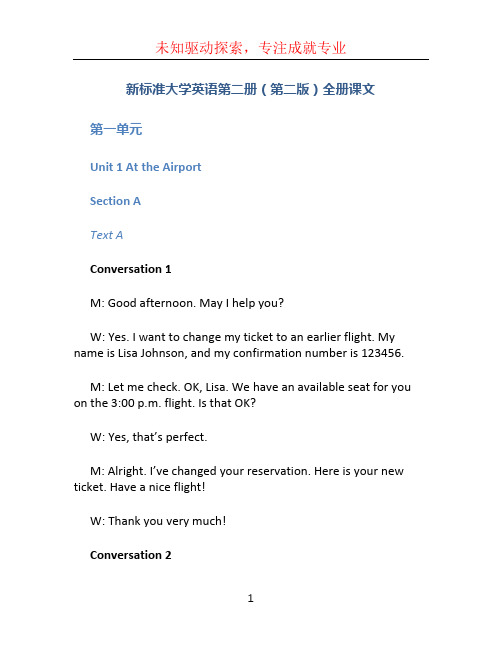
新标准大学英语第二册(第二版)全册课文第一单元Unit 1 At the AirportSection AText AConversation 1M: Good afternoon. May I help you?W: Yes. I want to change my ticket to an earlier flight. My name is Lisa Johnson, and my confirmation number is 123456.M: Let me check. OK, Lisa. We have an available seat for you on the 3:00 p.m. flight. Is that OK?W: Yes, that’s perfect.M: Alright. I’ve changed your reservation. Here is your new ticket. Have a nice flight!W: Thank you very much!Conversation 2M: Hi, I’ve got some extra t ime before my flight. Do you know if there’s a restaurant around here?W: Yes, there are a few restaurants in the airport. If you go to the second floor, there’s a food court with different options.M: Thanks! I’ll go check it out.W: You’re welcome!Text BConversation 1M: Excuse me. Is this seat taken?W: Oh, no. You can take it.M: Thanks. Can I use the pillow and the blanket?W: Sure. Help yourself. They are free for use during the flight.M: Great!Conversation 2M: Excuse me, is there a restroom on the plane?W: Yes, there’s one at the back of the airplane.M: How long does the flight take?W: The flight takes about four hours, including a stopover in Chicago.M: Oh, I see. Thank you!Section BText AListening 1Narrator: Welcome to the English Language Study Program at our university. Today, we are going to talk about the courses you will take during your studies. As you know, we have different levels—elementary, intermediate, and advanced. The courses you take will depend on your language ability. If you are an elementary student, you will begin with basic grammar and vocabulary classes. In these classes, you will learn simple sentence structures and common words. You will also practice listening and speaking skills through conversations and group activities. In the intermediate level, you will build on what you learned in the elementary level. You will study more complex grammar and expand your vocabulary. You will also read short stories and articles to improve your reading comprehension. In the advanced level, you will focus on advanced grammar, such as conditional sentences and reported speech. You will also read authentic materials like newspapers and academic texts. You will have the opportunity to express your opinions and ideas through debates and presentations. We hope you enjoy your studies here!Listening 2Narrator: Welcome to our university’s library. Here you will find a wide range of resources for your studies. Let me introduce you to the different sections in our library. We have a fiction section where you can find popular novels and literature. If you are interested in history or biographies, you can check out our non-fiction section. We also have a reference section with dictionaries, encyclopedias, and other reference books. In addition, we have a periodical section where you can find newspapers and magazines. If you are looking for computer resources or e-books, we have a digital section as well. Finally, we have a quiet study area where you can study in peace. Please be reminded to keep your noise level down and respect other students’ study time. Enjoy your time in the library!Text BListening 1Narrator: Welcome to the English Language Study Program at our university. Today, we are going to talk about the courses you will take during your studies. As you know, we have different levels—elementary, intermediate, and advanced. In the elementary level, you will start with learning basic greetings, introducing yourself, and asking simple questions. You will also learn about daily routines, family members, and describing people and places. In the intermediate level, you will continue to build on what you learned in the elementary level. You will study more complex grammar, such as past tenses and conditionals. You will also learn how to express your opinions and arguments in spoken and written English. In the advanced level, you will focus on academic skills, such as writing essays, giving presentations, and participating in discussions. You will also work on your listeningand reading skills through various authentic materials. We wish you success in your language studies!Listening 2Narrator: Welcome to our university library. Here you will find a wide range of resources to support your studies. Let me take you on a tour of our library. On the ground floor, we have the circulation desk where you can borrow and return books. We also have a self-checkout machine, which allows you to check out books by yourself. On the first floor, you will find the reference desk where our librarians are available to assist you with your research. This floor also houses our quiet study area, where you can concentrate on your studies without distractions. The second floor is home to the computer lab and the multimedia center, where you can access online databases and multimedia materials. Finally, on the third floor, we have group study rooms that can be booked in advance for group projects or study sessions. We hope you make good use of our library resources and have a productive academic experience!第二单元Unit 2 Taking a TaxiSection AText AConversation 1M: Excuse me, is this seat taken?W: No, it’s not. You can have it.M: Thank you.W: You’re welcome.Conversation 2M: Pardon me, do you know how much longer it will take to get to the airport?W: I think it should be about another 10 minutes. The traffic is quite heavy today.M: OK, thanks for letting me know.Text BConversation 1M: Excuse me, is this your bag?W: No, it’s not mine. Maybe it belongs to the passenger who sat here before me.M: Oh, I see. I’ll ask the flight attendant to take care of it.Conversation 2M: Do you mind if we lower the window a little? It’s too hot here.W: No, I don’t mind. Feel free to adjust the temperature to your comfort.Section BText AListening 1Narrator: Welcome to the English Language Study Program at our university. Today, we are going to talk about the courses you will take during your studies. In the elementary level, you will learn the basics of English, including greetings, introductions, and daily routines. You will also learn about different countries, cultures, and customs. In the intermediate level, you will build on what you learned in the elementary level. You will study more complex grammar topics, such as verb tenses, conditionals, and reported speech. You will also practice your reading and writing skills through various texts and assignments. In the advanced level, you will focus on academic English and critical thinking skills. You will learn how to write research papers, give presentations, and participate in discussions. You will also study advanced grammar structures and expand your vocabulary. We hope you enjoy your language studies!Listening 2Narrator: Welcome to our university library. We have a wide collection of books and resources to support your studies. On theground floor, you will find our fiction and non-fiction sections. The fiction section has a variety of novels, short stories, and poetry collections. The non-fiction section includes books on various subjects, such as history, science, and philosophy. On the first floor, we have our reference section, where you can find dictionaries, encyclopedias, and other reference materials. We also have a periodical section, which houses newspapers, magazines, and journals. The second floor is home to our digital section, where you can access e-books, online databases, and multimedia materials. Finally, we have a quiet study area on the third floor, where you can study in a peaceful environment. We hope you make the most of our library resources and have a successful academic journey!Text BListening 1Narrator: Welcome to the English Language Study Program at our university. Today, we are going to talk about the courses you will take during your studies. In the elementary level, you will learn the basics of English, such as greetings, introducing yourself, and asking and answering questions. You will also learn about different topics, including family, hobbies, and daily routines. In the intermediate level, you will continue to build on what you learned in the elementary level. You will study more complex grammar, such as different verb tenses and conditionals. You will also practice your listening and speaking skills through various activities and conversations. In the advanced level, you will focus on academic English and critical thinking skills. You will learn how to write essays, give presentations, and participate in discussions. You will also study advanced grammar and vocabulary to improveyour language proficiency. We wish you success in your language studies!Listening 2Narrator: Welcome to our university library. We have a wide range of resources to support your academic journey. On the ground floor, you will find our fiction section, where you can discover popular novels, classic literature, and poetry collections. The non-fiction section, also located on this floor, has books on various subjects, such as history, science, and philosophy. On the first floor, we have our reference section, which includes dictionaries, encyclopedias, and other reference materials. The periodical section is also on this floor, where you can find newspapers, magazines, and academic journals. In addition, we have a digital section on the second floor, where you can access e-books, online databases, and multimedia resources. Finally, we have a quiet study area on the third floor, where you can focus on your studies without distractions. We hope you find our library resources helpful and have a rewarding academic experience!(1208 words)。
全新版大学英语综合教程第二册1~6单元a课文翻译及原文 整理版
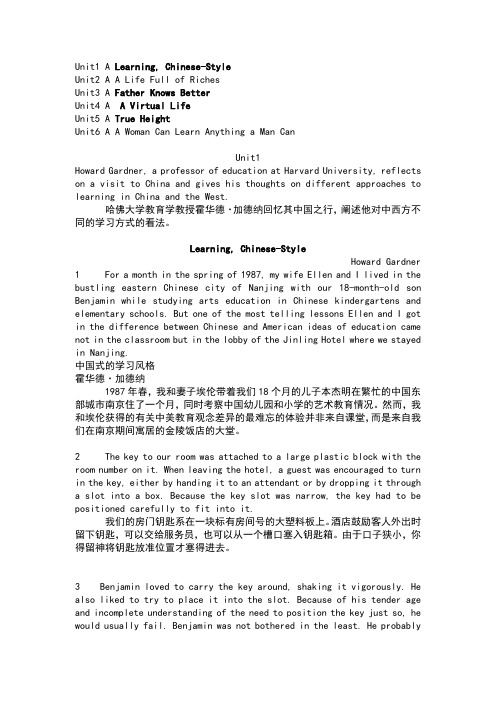
Unit1 A Learning, Chinese-StyleUnit2 A A Life Full of RichesUnit3 A Father Knows BetterUnit4 A A Virtual LifeUnit5 A True HeightUnit6 A A Woman Can Learn Anything a Man CanUnit1Howard Gardner, a professor of education at Harvard University, reflects on a visit to China and gives his thoughts on different approaches to learning in China and the West.哈佛大学教育学教授霍华德·加德纳回忆其中国之行,阐述他对中西方不同的学习方式的看法。
Learning, Chinese-StyleHoward Gardner 1 For a month in the spring of 1987, my wife Ellen and I lived in the bustling eastern Chinese city of Nanjing with our 18-month-old son Benjamin while studying arts education in Chinese kindergartens and elementary schools. But one of the most telling lessons Ellen and I got in the difference between Chinese and American ideas of education came not in the classroom but in the lobby of the Jinling Hotel where we stayed in Nanjing.中国式的学习风格霍华德·加德纳1987年春,我和妻子埃伦带着我们18个月的儿子本杰明在繁忙的中国东部城市南京住了一个月,同时考察中国幼儿园和小学的艺术教育情况。
- 1、下载文档前请自行甄别文档内容的完整性,平台不提供额外的编辑、内容补充、找答案等附加服务。
- 2、"仅部分预览"的文档,不可在线预览部分如存在完整性等问题,可反馈申请退款(可完整预览的文档不适用该条件!)。
- 3、如文档侵犯您的权益,请联系客服反馈,我们会尽快为您处理(人工客服工作时间:9:00-18:30)。
Unit 1How to StudyThere is a lot of misunderstanding about studying. Most students have not been taught the principles behind really effective working. Imagine a graph showing the amount a person learns against the number of hours he works in a day. If he doesn't do any work, he learns nothing (point 0). If he does an hour 's work he learns a certain amount (point 1). If he does two hours' work he learns about twice as much (point 2). If he does more work he'll learn still more (point 3). However, if he tries to do twenty-three and a half hours' work in one day, he'll be so tired that he'll hardly remember anything: what he learns will be very little (point 4). If he did less work he 'd learn more (point 5).Now whatever the exact shape of the graph 's curve, made by joining these points, it must have a high point. Point "X" is the very maximum anyone can learn in the day. And this represents the optimum, the best, amount of work to do. It is the best possible compromise between adequate time at the books and fatigue. Fatigue is an absolutely real thing; one can't escape it or ignore it. If you try to ignore it and press yourself to work past the optimum, you will only get on this downward slope and achieve less than the best—and then become very tired and lose your power of concentration.The skill in being a student consists of getting one 's daily study as near the optimum point as possible. I cannot tell you what the optimum is. It differs with the type of work, it differs from person to person, and even in the same person it varies from week to week. You must try to find your own. Every day you study, bear this principle of the optimum in mind. When you feel yourself getting fatigued, if you find yourself reading the same paragraph over and over again and not taking it in, that's a pretty good sign you 've reached your highest point for the day and should stop. Most ordinary students find their optimum at about five hours a day. Yours may be a little more or a little less—but if you get in five hours' good work a day, you will be doing well.Now, what are you doing with yourself when you aren't working? Before examinations some students do nothing at all except sit in a chair and worry. Here is another misunderstanding. People often think that the mind works like the body; it does not. If one wanted to save one 's physical energy in order to cut the maximum amount of firewood, one would lie flat on a bed and rest when one wasn't chopping. But the mind cannot rest. Even in sleep you dream, even if you forget your dreams. The mind is always turning. It gets its relaxation only by variety. That is what makes the mind rest.When you 've finished your optimum number of hours you must stop. You must not then sit around in the chair thinking about the work—that only tires without any learning. You must get out and do something. It doesn't matter what—anything so long as you are actively doing something else but work.有一个关于学习有许多误解。
大多数学生都没有真正有效的背后教工作的原则。
想象一下,一个图表显示的数额一人对他的小时数在一天工作学习。
如果他没有做任何工作,他学习什么(点0)。
如果他没有一小时的工作,他学到一定数额(第1点)。
如果他做了两小时的工作,他知道了两倍多(2点)。
如果他做更多的工作,他将学习更多的(3点)。
不过,如果他试图做23个半小时的工作,有一天,他会因为太累了,他会很难记住任何东西:他学习将是非常小(4点)。
如果他这样做较少的工作,他倒是学到更多(5点)。
现在,无论在图形的曲线精确形状,由这些点连接了,它必须有一个高点。
点“X”是任何人都可以学习很最高的一天。
这代表了最佳,最好的,要做大量的工作。
这是最好的可能的妥协之间有充分的时间在书籍和疲劳。
疲劳是绝对真实的东西,一个无法逃避它或忽略它。
如果你试图忽略它,然后按自己过去工作的最佳,也只获得这个走下坡路,实现比最好的,然后变得非常疲倦,失去你的集中力不足。
在当学生的技能获得一个'S作为由尽可能接近最佳点的日常学习。
我不能告诉你什么是最佳的。
它与不同类型的工作,它不同于他人的人,即使在同一人有异,从一周到一周。
你必须努力去发现你自己的。
每天你学习,牢记这个优化的原则。
当你觉得自己越来越疲惫,如果你发现自己阅读同一段一遍又一遍,不肯接受它,这是一个非常好的迹象你'维生素E达到了当天的最高点,应该停止。
最普通的学生发现在大约5个小时,每天的优化。
你可能会多一点还是少一点,但如果你在5个小时的工作,取得良好的一天,你会做得很好。
现在,什么是你自己做时,你不工作吗?一些学生考试前什么也不做,除了坐在椅子上和担心。
这里是另一个误解。
人们往往认为,思想就如同身体的工程,它不是。
如果有人想挽救一个人的身体能量,以减少对木柴的最高限额,一会平躺在床上休息时,一不砍。
但头脑不能休息。
即使在睡觉你的梦想,即使你忘了你的梦想。
心是永远转动。
它以品种,仅得到了缓和。
这就是使身心得到休息。
当你已经做完你的时间的最佳数目你必须停止。
你不能再坐在椅子上的思考的工作,没有任何学习的唯一轮胎。
你一定要出来做一点事。
这并不重要,任何事情只要你干点别的什么,但积极的工作。
Learning to Keep You Cool During TestsHave you ever felt so anxious during an examination that you couldn't even put down the answers you knew? If so, you were suffering from what is known as test anxiety.According to psychologist Ralph Trimble, test anxiety is a very real problem for many people. When you 're worried over your performance on an exam, your heart beats faster and your pulse speeds up. These reactions start others: You may sweat more than normal or suffer from a stomachache or headache. Your field of vision narrows and becomes tunnel-like. Before you know it, you 're having difficulty focusing."What I hear students say over and over again," says Dr. Trimble, who is working at the Psychological and Counseling Center at the University of Illinois, "is, 'My mind went blank.'"For a number of years, Dr. Trimble helped many students learn how to perform better during exams and to bring up their grades. Some of these students were interested in sharing what they learned and, with Trimble 's help, began holding workshops on overcoming test anxiety. For many students, just being in a workshop with other sufferers made them feel better. They realized that they were not the only ones who had done poorly on tests because of tension.The workshops were so successful that they are still given.In the workshops, students are taught that anxiety is normal. You just have to prevent it from getting the best of you. The first step is to learn to relax. If before or during an examination you start to panic, stretch as hard as you can, tensing the muscles in your arms and legs; then suddenly relax all of them.This will help relieve tension. But keep in mind that you don't want to be too relaxed. Being completely relaxed is no better than being too tense. "If you are so calm you don't care how you do on an examination, you won't do well," Trimble says. "There is an optimum level of concern when you perform at your best. Some stress helps. There are people who can't take even slight stress. They have to learn that in a challenging situation, being anxiously excited is good and will help them to do better. But if they call it anxiety and say, 'It's going to hit me again,' that will make them nervous and worried."As a student you must also realize that if you leave too much studying until a day or two before the examination, you can't do the impossible and learn it all. Instead, concentrate on what you can do and try to think what questions are likely to be asked and what you can do in the time left for studying.When you sit down to study, set a moderate pace and vary it by reading, writing notes, and going over any papers you have already written for the course, as well as the textbooks and notes you took in class. Review what you know. Take breaks and go to sleep early enough to get a good night 's rest before the exam. You should also eat a moderate breakfast or lunch, avoiding drinks like coffee and stay away from fellow students who get tense. Panic spreads easily.Get to the exam room a few minutes early so that you will have a chance to familiarize yourself with the surroundings and get out your supplies. When the examination is handed out, read the directions twice and underline the significant instructions, making sure you understand them. Ask the teacher to explain if you don't. First answer the easiest questions, then go back to the more difficult.On essay questions, instead of starting right away, take a few minutes to organize your thoughts, make a brief outline, and then start off with a summary sentence. Keep working steadily, and even when time starts to run out, don't speed up.你们可曾想过在一个考试,你甚至不能放下手中的答案你知道这样紧张?如果是这样,你的痛苦,什么是已知的考试焦虑。
